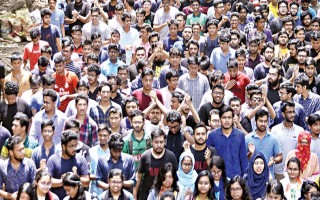BUET protesters vow to carry on boycott
The protesting students of Bangladesh University of Engineering and Technology on Monday vowed to continue their boycott of all academic activities while the university authorities sought two more weeks to meet all of their demands.
BUET vice-chancellor Professor Saiful Islam sought the time on Monday noon after protesters met with him regarding the progress on their demands.
Earlier on November 14 the protesters placed three fresh demands in order to resume their academic activities after police submitted charge sheet against 25 Bangladesh Chhatra League activists for torturing Abrar Fahad to death on October 7.
The demands include expulsion from BUET of all the accused in the killing of their fellow student Abrar Fahad Rabbi.
Emerging from the meeting, a mechanical engineering student, also one of those leading the protests, said preferring anonymity that they wanted to know about the development on their three new demands which they had submitted on November 2.
The demonstrators, who have not been attending any academic activities since October 16, also said that they would not go back to their studies until those involved in Abrar murder were permanently expelled from the university.
The two other new demands are action against those who were involved in ragging at the university’s different halls of residence in the past and inclusion of a new chapter in the university’s ordinance against organisational student politics and on measures against ragging.
The university’s students welfare director Professor Mizanur Rahman said that protesters and the university authorities had held a meeting and they might need three more weeks to fulfil the demands of the students.
He, however, said that they would try their level best to meet all the demands within two weeks of which the vice-chancellor had also assured the protesters.
Meanwhile, deputy minister for education Mohibul Hassan Chowdhoury on Monday said that a Bangladesh Nationalist Party-backd lawyer, also father of a BUET student, had instigated the student movement.
Addressing a press conference at the International Mother Language Institute in the capital, Mohibul, also an organising secretary of the ruling Awami League, said that the government had specific evidence that the guardian had provoked the BUET protests through his child.
‘We are urging the guardians of the BUET students to act responsibly to keep their children’s academic career smooth,’ he said, warning that otherwise the government would take action.
The ministry waited so far considering the future of the students and the social status of the guardian, he added.
He also expressed dissatisfaction over the statements issued by some foreign missions and agencies regarding the BUET issue.
Questioning the necessity of the BUET protest, the deputy minister asked why should the students continue the movement even after all the accused were arrested and charge sheet was submitted under the direct instruction of the prime minister.
He said that a vested political quarter was trying to create unrest at universities as they had failed in politics.
A ‘small’ left group is also creating unrest at a university while there was lack of discipline in the party, he went on.
He remarked that some student organasations had grouped under a banner recently while they had no capacity to come forward with their own banners.
On October 13, Dhaka Metropolitan Police additional commissioner Monirul Islam at a briefing at their media centre said that they had identified 11 of the 25 people who were involved in the torture that left Abrar dead while the rest were ‘directly’ or ‘indirectly’ involved in the brutal killing.
But he did not name the 11.
Monirul said that they had named 25 students of the university, including 19 named in the first information report filed with Chawkbazar police station by Abrar’s father Barkat Ullah.
The charge sheet mentioned 21 of the 25 accused, who were arrested, while the rest four were still in hiding, Monirul said, adding that they had named 31 prosecution witnesses, including Abrar’s six family members, seven BUET teachers and physician, 13 students, and five employees.
Eight of the 25 suspects made statements before metropolitan magistrates in Dhaka in the midst of investigation.
Abrar, a second-year student of electrical and electronic engineering at the university, was tortured to death by a group of Bangladesh Chhatra League leaders at Sher-e-Bangla Hall, allegedly for his critical views on social media over deals signed between Bangladesh and India.
The agitating students began boycotting their classes and examinations on October 16 seeking permanent expulsion of the killers from the university capping their 11-day-long field agitation.
The students earlier placed 10-point demands that included rustication of the killers of Abrar from the university, capital punishment for them, compensation to Abrar’s family, bearing the expenses for running the case, speedy trial of the case, making the charge sheet public, rustication from the university of all those involved in torturing students in the past and banning organisation-based student politics at the university.
In the face of the student agitation, the university authorities issued five separate notices announcing a ban on organisation-based politics on the campus, conducting drives against illegal occupants at the university’s student halls and sealing off the student organisation offices at the university, and introducing a web portal where students could file complaints about any kind of abuse.
News Courtesy: www.newagebd.net











